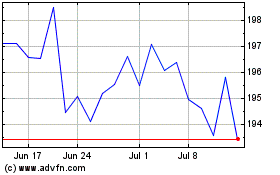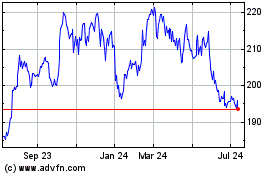UPDATE: Private-Equity Cos Seen Backing New Clearinghouse - Sources
November 15 2011 - 1:15PM
Dow Jones News
Private-equity companies are backing the development of a new
clearinghouse, according to people familiar with the matter, a move
apparently designed to compete with similar trade-processing venues
affiliated with major banks.
The identities of the private-equity backers behind the project,
called "Baseclear," couldn't be learned, nor could its location or
the types of contracts on which the new venture will focus on
clearing.
Clearing is a process that involves a central counterparty
standing between trading parties and guaranteeing their contractual
obligations in case a member of the clearinghouse defaults. But
bank ownership of clearinghouses has made regulators across the
globe nervous as they look to see more financial instruments,
including privately traded derivatives, processed centrally.
Regulators are leery of allowing the clearing industry--which
they consider a key safety net for financial markets--to be
controlled by big banks, which they often see as contributing to
risks in the system.
Work on Baseclear is at a very early stage, but its current
ownership structure would seem to set it apart from existing
central clearing organizations that are partly owned by banks,
possibly making it more attractive to regulators.
The 2010 Dodd-Frank U.S. financial-regulation overhaul law,
which will require a large portion of the privately traded
derivatives--or swaps--market to be cleared, specifically restricts
dealer banks' control over derivatives clearinghouses and trading
platforms. Regulators outside the U.S. are considering similar
caps.
Restrictions on dealer banks' stakes in clearinghouses grow out
of concern about having derivatives markets "too much under the
control of one group," said Darrell Duffie, professor of finance at
Stanford University and an expert in clearing. There also are
concerns on "conflicts of interest in risk requirements," he
added.
Duffie said a private-equity-owned clearinghouse would seem to
"fit very well with the Dodd-Frank requirements on limits to bank
ownership of clearinghouses."
The business of clearing is growing fast, with pending
regulation helping it gain traction among users and interest
growing from that penetration. A Citigroup report earlier this year
estimated that two thirds of the $600 trillion swaps market will be
cleared under proposed regulations.
"The business of clearing hasn't been touted as something that
has very high margins," said Duffie, but he said regulations
limiting banks' affiliations with central counterparties may make a
compelling case to build a new, independent clearinghouse.
"Clearinghouses can be part of multipurpose financial businesses
that involve data, execution and clearing," he said.
Exchanges around the world have seen a wave of
merger-and-acquisitions activity in recent months, and even
LCH.Clearnet, which owns the largest global clearinghouse for
interest-rate swaps, has been recently been in play. This suggests
market participants expect clearing to play a vital role in
financial markets, lending weight to the notion of private-equity
companies doing the initial legwork for a handsome payoff
downstream.
Peter Burton, a managing director at trading platform
consultancy Delta Markets Group and part of the founding group of a
former venture capital-backed clearinghouse and exchange called
onExchange, said one opportunity would be to offer a better
clearinghouse model in terms of technology, or possibly a structure
that better supports new trading firms brought about by proposed
regulations.
"We've seen a number of new trading facilities launched for
swaps as a direct result of new regulation, so perhaps this group
sees an opportunity to launch a new clearinghouse along the same
lines," said Burton.
"A new independent clearinghouse in Europe may be seen as
warranted," he continued. "LCH.Clearnet successfully clears trades
at multiple exchanges, and is independent. But maybe someone said
there is room for another."
The world's largest clearinghouses include: Eurex Clearing, a
joint venture between Deutsche Boerse AG (DB1.XE) and SIX Swiss
Exchange, with institutional investors but no significant bank
ownership; LCH.Clearnet, which is owned 17% by exchanges and 83% by
its users, including banks and brokers; CME Group Inc. (CME), which
is publicly traded; and IntercontinentalExchange Inc. (ICE), which
has clearinghouses for futures and energy swaps, but also two
credit-default-swap clearinghouses that share approximately 35% of
CDS clearing profits with a group of 10 banks and other non-bank
members.
Burton said a new independent clearinghouse may find it
challenging to sign up members, however. "One of the things we
faced when we were setting up onExchange was the last thing in the
world any of the investment banks or futures commission merchants
wanted was to join another clearinghouse," he said. "Members don't
necessarily want to invest the time and infrastructure resources to
back any new exchanges or new clearinghouses."
In the absence of clearing members, the private-equity companies
would need a pot of money to back trades and create an alternative
structure to collect collateral and margin, said Burton. That way,
the investors could potentially back the transactions cleared
through Baseclear, and eventually leverage off that to attract more
trades into the clearinghouse.
-By Katy Burne, Dow Jones Newswires; 212-416-3084;
katy.burne@dowjones.com
CME (NASDAQ:CME)
Historical Stock Chart
From May 2024 to Jun 2024

CME (NASDAQ:CME)
Historical Stock Chart
From Jun 2023 to Jun 2024
